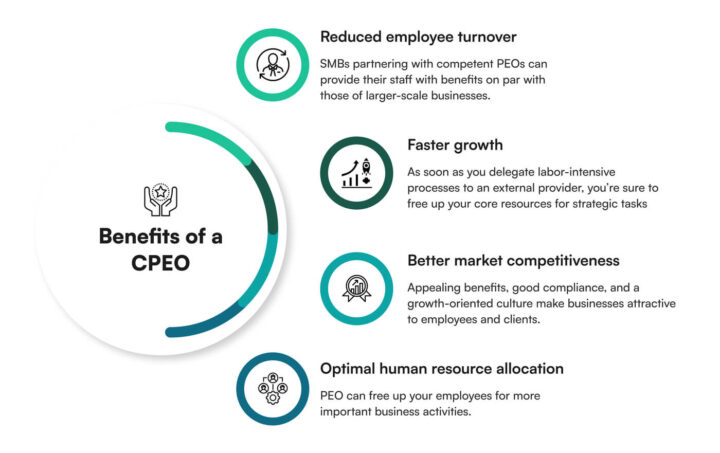The modern business landscape is dynamically evolving and increasingly competitive. This environment is too harsh for small and medium businesses (SMBs), which are forced to struggle for survival and growth against well-established giants. Insufficient operational budgets and a lack of competent resources to manage organizations’ daily routines are probably the reasons why over 50% of businesses fail within their first five years.
If you’re an SMB, having a Professional Employer Organization (PEO) by your side is of great help to your daily HR operations. These organizations typically specialize in HR tasks, employee benefits management, payroll, risk and compliance monitoring, and reporting. Thus, a PEO can minimize your time on HR tasks and reduce employment risks, which significantly contributes to business performance in the long run.
Since the chosen PEO gets access to your sensitive employee management information, you can’t simply go for the first-best option. Yet, how can you find truly reliable professional employer organizations in a crowded market? This is where the certified PEO comes into play. This article introduces you to the CPEO concept and explains the key certified professional employer organization benefits for various aspects of your business.
Introduction to the Term: What Is a CPEO?
Simply put, a certified professional employer organization is a PEO certified by the Internal Revenue Service (IRS). The CPEO concept emerged in 2014 with the introduction of the Small Business Efficiency Act (SBEA). Among many other guidelines aimed at supporting small and medium-sized organizations, the SBEA required the IRS to establish the first-of-a-kind voluntary certification program for PEOs. The process was fruitful, with 35 PEO entities receiving the CPEO badge from the IRS based on a well-defined set of excellence criteria.
As of 2024, the IRS sets the following criteria for professional employer organization certification:
✔ Be a formally incorporated business entity.
✔ Have at least one physical office in the USA.
✔ Exhibit tax compliance at the federal, state, and local levels.
✔ Be a financially responsible company.
✔ Submit proof of positive working capital.
✔ Exhibit a high degree of organizational integrity.
✔ Should have competent individuals on its management board.
Companies meeting these standards and wishing to become CPEOs can apply via the online registration system on the IRS website. The company’s owners will have to complete the individual identity verification procedure and go through the responsible individual personal attestation (RIPA) process. All applications are processed in compliance with the CPEO Application Privacy Act and Paperwork Reduction Act.
A PEO’s Scope of Functions
Essentially, a PEO is an outsourcing company that can assume full responsibility for your payroll, employment law compliance, and HR-related business routines, such as:
- Tax administration and planning of employee benefits. A PEO can manage tax administration, your staff’s healthcare benefits, life and disability plans, 401(k) and other savings plans, and any voluntary and complemental benefits your company provides.
- Administrative tasks. This scope typically includes payroll, staff recruiting, talent management, staff retention, and employee training and development programs. A PEO can also monitor staff attendance and perform work scheduling, comprehensive performance management, and any types of HR management activities.
- Risk and compliance management. A partnering PEO can assume full responsibility for the legal side of your business functioning, from handling employee lawsuits to staff compensation and OSHA support. A PEO should also be competent in workplace safety procedures and documentation and take care of Affordable Care Act (ACA) compliance. You may also delegate I-9 verification procedures, employee policies, and notifications to your hired PEO.
Such companies provide invaluable assistance to SMBs and startups that usually don’t have standalone HR departments because of financial constraints. For them, the scope of HR routines represents an unavoidable administrative burden. Thus, outsourcing HR to a PEO allows businesses to focus on development and strategizing instead of wasting core business resources on administrative routines.
CPEO vs. PEO: Key Differences and Similarities
A PEO and a CPEO are generally the same type of organization with a similar scope of competencies and services. The main difference lies in the degree of reliability and trust associated with a certified PEO versus a non-certified PEO. Yet, due to its IRS certification, a CPEO also enjoys a bit different official status in the aspect of taxation for organizations. That’s why it preserves the client’s ability to retain specific tax credits and avoid the wage base restarts (e.g., Social Security and Medicare taxes) as soon as the contract for CPEO services is signed.
As for the distinctions between CPEO and PEO, the following table summarizes the main points that you may find significant as a business owner.
| PEO | CPEO | |
|---|---|---|
| Certification | No IRS certification | A valid IRS certificate is obtained as a result of a rigorous screening process |
| Tax liability | A PEO’s failure to remit employment taxes results in the company’s liability | A CPEO holds exclusive responsibility for employment tax remittance, with clients freed from tax remittance obligations even if the CPEO fails to complete this task |
| Tax credit | Working with a PEO can add complexity to federal tax credit claiming | CPEO clients remain eligible for federal tax credits |
| Regulatory control | PEOs are not regulated or subject to IRS monitoring | CPEOs are subject to close regulatory controls by the IRS |
| Wage base reset | The client switching a partnering PEO may be subject to wage base reset | No wage base reset applies |
| Degree of risk | From low to high, depending on the due diligence applied in PEO selection | Low |
Here is a more detailed breakdown of the differences presented above:
Any company can claim to be a competent PEO, and only trial and error will help you determine whether it delivers on its promise. When choosing a CPEO, you go for the sure option of an IRS-certified company, knowing that the IRS has already subjected it to scrutiny and has verified its competence, professionalism, and integrity.
When you work with a PEO, its failure to file all taxes may result in your liability. Certified PEO companies assume full liability for tax filing, thus freeing you from liability even in case of failure to complete timely and accurate tax remittance procedures on your behalf.
Those who partner with a regular PEO may find it challenging to claim their federal tax credits. The reason is the pegging of tax credits to the Employer Identification Number (EIN). Being a CPEO client removes this problem because this company is officially regarded as a “successor employer,” thus helping you avoid double taxation and enjoy a simpler credit-claiming process.
PEOs are not specifically regulated, so their operations may not undergo close compliance oversight by relevant state agencies. CPEOs operate under the close gaze of the IRS, thus exhibiting an unchangeably higher level of trustworthiness, reliability, and excellence.
A company’s wage base subject to tax benefits has annual limits. Wage base reset happens when the employee starts working for a new employer in the middle of the tax year. When you work with a non-certified PEO, you may be subject to wage base reset (though not necessarily), which causes double taxation and excessive expenditures on your part. If you work with a CPEO, the company is officially regarded as a “successor employer” in the taxation field, so your business won’t be taxed additionally.
Working with a non-certified PEO is not necessarily a bad idea, as some organizations are indeed good and reliable. Yet, you will have to trust their words and verify their level of professionalism on your own example, while working with a CPEO is always a low-risk decision for clients due to IRS certification and robust control.
Benefits of Having a CPEO at Your Service
Recent statistics show that over 180,000 businesses in the US partner with PEOs to streamline their administrative, compliance, and HR-related routines. These figures suggest that a PEO can significantly reduce the administrative burden of any business, thus allowing companies to grow faster and maximize employee satisfaction. By partnering with a CPEO, you are sure to reduce the risk of popping at an incompetent service provider and get access to a wide range of certified PEO benefits, such as:
SMBs partnering with competent PEOs can provide their staff with benefits on par with those of larger-scale businesses. This benefit is sure to increase staff satisfaction and improve the internal business culture, resulting in low turnover rates.
As soon as you delegate labor-intensive processes to an external provider, you’re sure to free up your core resources for strategic tasks, such as business development and growth.
Appealing benefits, good compliance, and a growth-oriented culture make businesses attractive to employees and clients. Efficiency gains in your HR workflow and a strong focus on revenue-generating activities also contribute to business competitiveness.
While routine administrative tasks, such as payroll or taxes, often waste too much time for your competent core staff, a PEO can free up your talented employees for more important business activities.

All these benefits, coupled with efficient compliance and accurate tax reporting, are sure to empower businesses for unprecedented growth. It’s much easier to scale up with a reliable partner ready to assume responsibility for administrative routines and cover your back in all legal and taxation terms – operational aspects that can drain any company’s scarce resources.
Alternatives to CPEO Certification
While the CPEO certification by the IRS seems to be the top level of credibility assessment in the PEO niche, companies that can’t get that badge or are only undergoing this process may verify their credentials in several other ways. You may also check the following certificates when choosing a PEO for collaboration:
- System and Organization Controls (SOC) 1 Type 2 certification is an internationally recognized certificate for businesses dealing with financial reporting, payroll, and data security. It was developed by the American Institute of Certified Public Accountants (AICPA) and also verifies a PEO’s high standing in the industry.
- Employer Services Assurance Corporation (ESAC) is another entity that can verify all critical aspects of PEO’s operations, ranging from the company’s financial health to ethical business practices and compliance with state regulations.
- Certification Institute (CI) credentials also provide added trust and confidence in the PEO businesses. CI certification proves that the company you’re considering manages risk professionally, has a safe work environment, and can address workers’ compensation losses.
Even if your chosen PEO doesn’t have any certificates mentioned above, you can conduct due diligence by contacting its previous and current clients for first-hand references or studying its reviews on trusted platforms. Any of these efforts will give you valuable information for making an informed decision.
Working with a CPEO: A Sure Path to HR Excellence
Here is everything you should know about a CPEO, starting from the CPEO meaning and ending with alternative certifications of PEO businesses. As you give a PEO company access to your administrative processes and delegate critical compliance procedures to it, you should be 100% confident in its credibility and reputation.
Turning to GEOR is your safe bet. Bank on our solid
expertise in the PEO service industry and enjoy
the full spectrum of administrative assistance.

